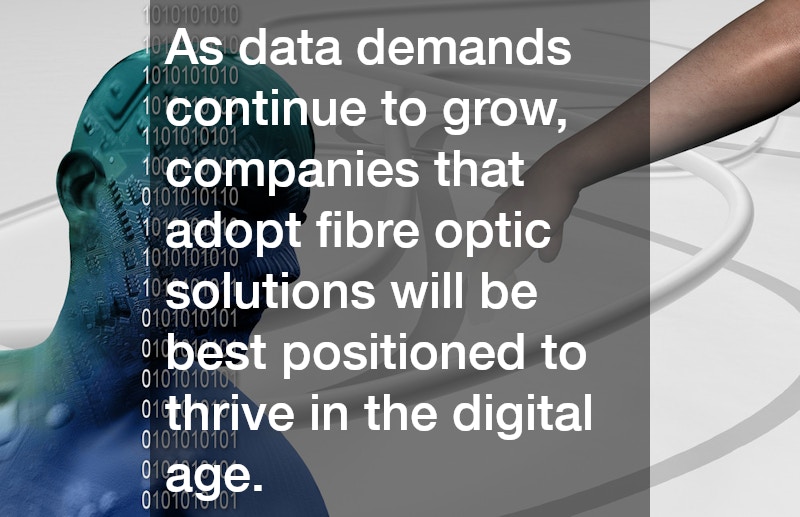In today’s hyper-connected world, businesses must rely on fast, stable and secure internet connections to stay competitive. Whether it’s managing cloud-based operations, conducting video conferences, or transferring large data files, a high-performance internet connection is crucial. Fibre optic installation offers a superior solution that is rapidly becoming a foundational component of business infrastructure. For organisations looking to future-proof their operations, investing in fibre optics is no longer optional—it is essential.
Unparalleled Speed & Bandwidth
One of the most significant benefits of fibre optic installation is the dramatic increase in internet speed. Traditional copper-based connections can struggle to keep up with the modern data demands of businesses. Fibre optics, on the other hand, can transmit data at lightning-fast speeds, making them ideal for businesses that require heavy internet usage. This includes companies in media production, architecture, engineering, and any other field that transfers large files daily. With fibre optic internet, employees can upload and download documents, access cloud-based software, and collaborate online with minimal delays. This seamless access to resources boosts productivity and efficiency across departments.
Bandwidth is another critical factor. Fibre optic cables offer much higher bandwidth capacity compared to older technologies. This means that multiple users can access high-speed internet simultaneously without experiencing slowdowns. As businesses adopt more digital tools and remote work becomes more common, the demand for robust and reliable bandwidth continues to grow. Fibre optic installation ensures that your network is capable of handling these demands today and well into the future.
Enhanced Reliability & Signal Strength
Unlike copper cables, fibre optic cables are less susceptible to environmental interference. They do not conduct electricity, which makes them immune to issues such as electromagnetic interference from nearby machinery or weather-related disruptions. This translates to a more stable and consistent internet connection, which is especially important for businesses that operate critical systems or offer real-time services to clients.
Signal degradation over long distances is also minimal with fibre optics. In traditional systems, the signal weakens as it travels further from the source. Fibre optic cables maintain the strength and clarity of the signal across long distances, which is particularly advantageous for businesses with large premises or multi-building campuses. Whether it’s connecting departments across a corporate headquarters or linking various branch offices, fibre optic installation offers the reliability needed to maintain uninterrupted operations.
Better Security & Data Protection
Data security is a top concern for modern businesses. The threat of cyber attacks and data breaches makes it crucial to choose infrastructure that offers robust protection. Fibre optic cables are inherently more secure than their copper counterparts. Unlike copper lines, which can be tapped relatively easily, fibre optics do not radiate signals and are extremely difficult to intercept without detection. Any attempt to tap into a fibre line typically causes noticeable disruptions, alerting businesses to the breach.
This added layer of security is especially important for industries that handle sensitive information, such as healthcare, finance, and legal services. By choosing fibre optic installation, businesses can significantly enhance their data protection measures and comply more effectively with stringent regulatory requirements regarding information security.
Supports Emerging Technologies & Scalability
As businesses continue to evolve and adopt new technologies, it’s vital that their infrastructure can support these changes. Fibre optic networks are highly scalable, enabling businesses to increase their internet capacity as needed without overhauling their entire system. This flexibility makes fibre optic installation a future-proof investment.
Fibre optic infrastructure also supports the growing use of technologies such as cloud computing, Internet of Things (IoT), and artificial intelligence (AI). These innovations require high-speed, low-latency internet to function effectively. For businesses looking to stay ahead of the curve and leverage digital transformation, fibre optics provide the ideal foundation.
Additionally, fibre optic connections are crucial for supporting unified communications platforms, which integrate various communication tools—such as voice, video, email and instant messaging—into a single system. These platforms are essential for fostering collaboration and efficiency within teams, particularly in hybrid and remote work environments.
Improved Business Continuity & Customer Experience
Downtime can be costly for any organisation. From lost productivity to dissatisfied clients, even brief internet outages can have significant repercussions. Fibre optic installation helps mitigate this risk by offering a more reliable and resilient network. With reduced risk of outages and better performance, businesses can maintain their services consistently and meet customer expectations without disruption.
A smooth and uninterrupted internet connection also contributes to a better customer experience. For companies that offer customer support or online services, lag or disconnection can frustrate users and damage brand reputation. Fibre optic networks ensure that these services run smoothly, providing faster response times and higher quality interactions.
The Business Case for Fibre Optic Installation
Fibre optic installation is not just a technical upgrade—it is a strategic investment that supports every facet of modern business operations. From speed and reliability to security and scalability, fibre optics offer tangible benefits that help businesses perform better, serve customers more effectively, and stay ahead in a competitive marketplace. As data demands continue to grow, companies that adopt fibre optic solutions will be best positioned to thrive in the digital age.



